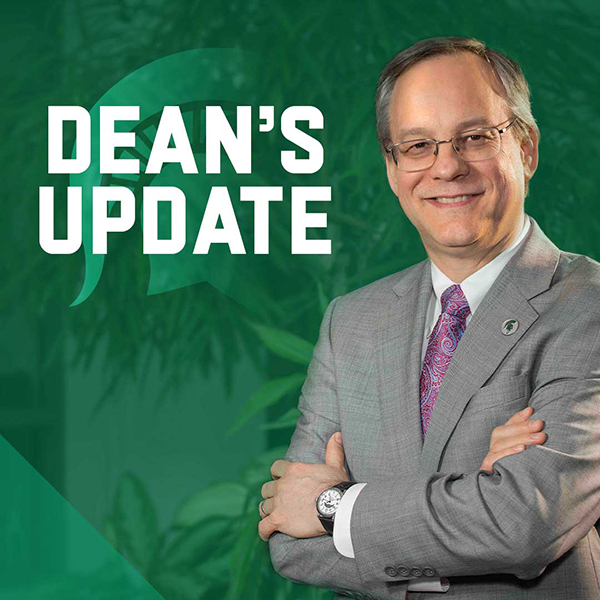Dean's Update
October 6, 2023 - Aron Sousa, MD

Friends,
Last week I was in New York City and then Washington, DC, visiting with donors and most of the offices of the Michigan delegation to the Senate and House. I had the pleasure and privilege to talk about the great work of our students, staff, and faculty including our impact on national policy, our scholarship and contributions to health, and how the college bolsters the physician, scientific, and public health workforce in the state and country. I also took the time to describe how our work supports local economies of the state, including more than $300 million per year in economic impact in West Michigan and more than 200 new jobs in Flint. Our impact is very large for our size thanks to the hard work of our people and our partners.
In the next month or so, we will get our summary findings from the LCME. We have seen a draft by the site team, but that draft will change with the review by the LCME committee. I am pretty sure that the struggles we faced with MSU financial aid in the last two years will be citations. The problem has been solved for the last two semesters, but prior to that, the new software systems of the university were not providing timely disbursements to the professional students of the Law, Osteopathic, Veterinary, and Human Medicine colleges. We were all upset, but it was the students who suffered.
The college has a robust set of training events and systems for reporting/tracking student mistreatment. We have a very diverse class doing community-based education in America, so there is student mistreatment to be reported and investigated. Significant reporting is needed for any improvement in our system. Since the federal government mandated needed changes in the university’s reporting and investigation systems, the process has become independent of the college and follows the timeline of the complainant and respondent rather than the college. Investigations take longer and the college does not have information until the end of the process. It is common for the full process to take nine months or more. If you are a student proximate but not involved in the investigation, it can feel like nothing is happening and there is no information from the process or the college. I understand why students are not satisfied, and I expect the LCME will not be satisfied either, but we are working on additional trainings and improved programs for addressing student mistreatment.
We will have to wait for the summary report and decisions. The LCME can decide to add to the list of problems and can remove items from the list. I’ve seen both happen in our previous site visits. Mostly, I want to express my sincere gratitude for our team of students, faculty, and staff who have done so much great work on this process in the last few years. I’ll note that whole effort was complicated by dealing with COVID during our data collection year. Thank you one and all.
Ten years ago, we did our first ECE pilot of the Shared Discovery Curriculum. As design and implementation moved ahead, the competency assessment system became more and more robust, and I came to hope that we would find a way for students to move through the curriculum faster, if they were making excellent progress. I also hoped students might enter the curriculum in the second year if they had significant, meaningful clinical experience. The curriculum committee was working on those concepts before I left academic affairs and the pandemic hit.
I am happy to say Drs. Wendling and DeMuth, the curriculum team, and our community campuses have found a way to initiate both faster student progress and advanced entry into the curriculum. Starting this year, students who finish the Middle Clinical Experience and Step 1 soon enough will be able to enter the LCE in early summer rather than fall, which will allow them to take Step 2 sooner. This sounds easy to do, but I assure you it was not.
To begin an advanced entry opportunity, the college is partnering with the Henry Ford Health’s Oral Maxillary Facial Surgery (OMFS) residency program to admit dentists into CHM on a six-year path to completing their MD and OMFS residency. These dentists have already taken a great deal of basic science and pharmacology. After a “boot camp,” including training to do H&Ps, differential diagnosis, and key clinical skills work, these students will enter the MCE on their way to a combined LCE-residency schedule. If it works as we hope, this may create other opportunities for students with advanced clinical skills and background knowledge to shorten their path through our curriculum.
Back in July, the Town Hall hosted a group of students in our premier Leadership in Rural Medicine certificate program to present their experiences and activism related to rural communities. This week, you can learn more about one of those students in MSUToday. Eneka Lamb is a third-year student in Midland and is currently chair of the National Rural Health Association Constituency Group. She comes to that work after three years in the Peace Corps and spending her childhood in Hong Kong. It is a remarkable story of curiosity and service stretching from East Asia to rural Guyana to Pigeon, Michigan.
Serving the people with you,
Aron
Aron Sousa, MD, FACP
Dean

